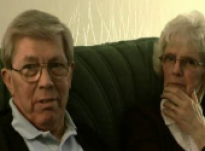Geoff - Interview 16

More about me...
Geoff woke up one morning feeling sick and perspiring, and he then lost consciousness. His wife was concerned and called for an ambulance. He was taken to hospital where a brain scan confirmed that he had experienced a mini stroke. Geoff does not remember too many details about what actually happened but he stayed in hospital for around 10 days during which time he had difficulties with speech and mobility, and his eyesight was impaired to some degree. During his time in hospital he had physiotherapy to help with his mobility problems and some help re-learning tasks such as making tea and toast.
Geoff has been told by the optician that his eyesight has deteriorated and he can no longer drive the car
Geoff has been told by the optician that his eyesight has deteriorated and he can no longer drive the car
Geoff - About my, my vision? Well I, I was going up to the optician and up at the hospital and they were , they were doing the visual field test and realised that I had this problem and said it probably won’t get any better. But now normal, you know, normal living I don’t seem to have any problem with my eyesight. And this is, this is why it gets me so upset really.
Geoff had never heard the term TIA before, and doesn't remember being told what the difference was between a TIA and Stroke.
Geoff had never heard the term TIA before, and doesn't remember being told what the difference was between a TIA and Stroke.
Enid' Hm. Yeah.
Geoff remembers a small incident that happened prior to his TIA and thinks now that he should have seen the doctor about it.
Geoff remembers a small incident that happened prior to his TIA and thinks now that he should have seen the doctor about it.
Enid rang the doctor as soon as she realised that Geoff was unwell and the GP arranged for an ambulance to be sent straight out.
Enid rang the doctor as soon as she realised that Geoff was unwell and the GP arranged for an ambulance to be sent straight out.
And that’s where I stayed.
Enid: Until he came home.
Geoff: How long was I in?
Enid: Nearly a fortnight. Well, it happened on the 27th of July and it was the beginning of August when you came out.
Geoff's wife saw that he was having a dizzy spell and encouraged him to go to see the GP who adjusted his medication
Geoff's wife saw that he was having a dizzy spell and encouraged him to go to see the GP who adjusted his medication
Enid - Well, the other week, a few weeks ago you said you were going dizzy when you bent down. And it was me that spotted it because I, and I said, “Are you dizzy?” He said, “Yes.” I said, “Right, the doctor’s.” So the doctor looked at his prescriptions and he said, “Well, I will take you off this straight away and put you on another one.” And he said, “I’ve been on that since I had my heart by-pass.” He said, “Yes, you probably have.” He said, “Because then in 2001 that was the gold star.” He said, “Now what I’m going to put you on now is the gold star.”
Geoff still gets numbness in his arms and hands ' 'it was worse and it has improved but it's not fully back to how it was originally'.
Geoff still gets numbness in his arms and hands ' 'it was worse and it has improved but it's not fully back to how it was originally'.
Geoff' my main therapy was walking and …
Geoff and his wife find it more difficult to visit their daughter in Cornwall and it takes a lot longer to get to the hospital for outpatient appointments without the car
Geoff and his wife find it more difficult to visit their daughter in Cornwall and it takes a lot longer to get to the hospital for outpatient appointments without the car
Geoff' It’s made a great impact. I mean, we’re fortunate in having our bus passes. I mean, we’ve got our over, over-60s railcards and bus passes. I mean, our daughter lives down in, in Cornwall and we used to drive down there to see them. And after I had my stroke my daughter came up didn’t she?
Geoff feels frustrated that he is not allowed to drive because he feels he can see well enough to do so
Geoff feels frustrated that he is not allowed to drive because he feels he can see well enough to do so
About my vision? Well I, I was going up to the optician and up at the hospital and they were , they were doing the visual field test and realised that I had this problem and said it probably won’t get any better. But now normal, you know, normal living I don’t seem to have any problem with my eyesight. And this is why it gets me so upset really.
Geoff's wife helps him remember what medication he takes and she noticed when he seemed to be experiencing side effects
Geoff's wife helps him remember what medication he takes and she noticed when he seemed to be experiencing side effects
So you’re on warfarin which thins the blood, doesn’t it? Are you on any other medication?

